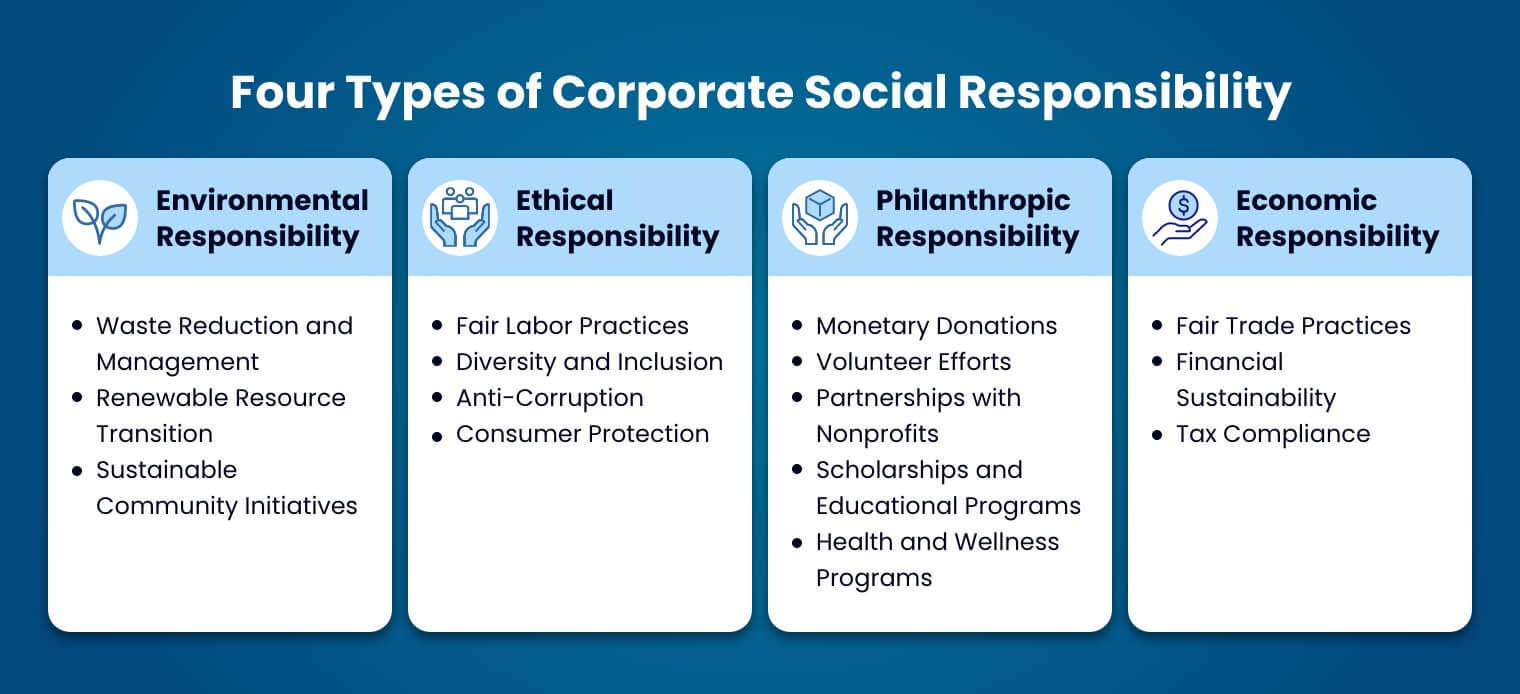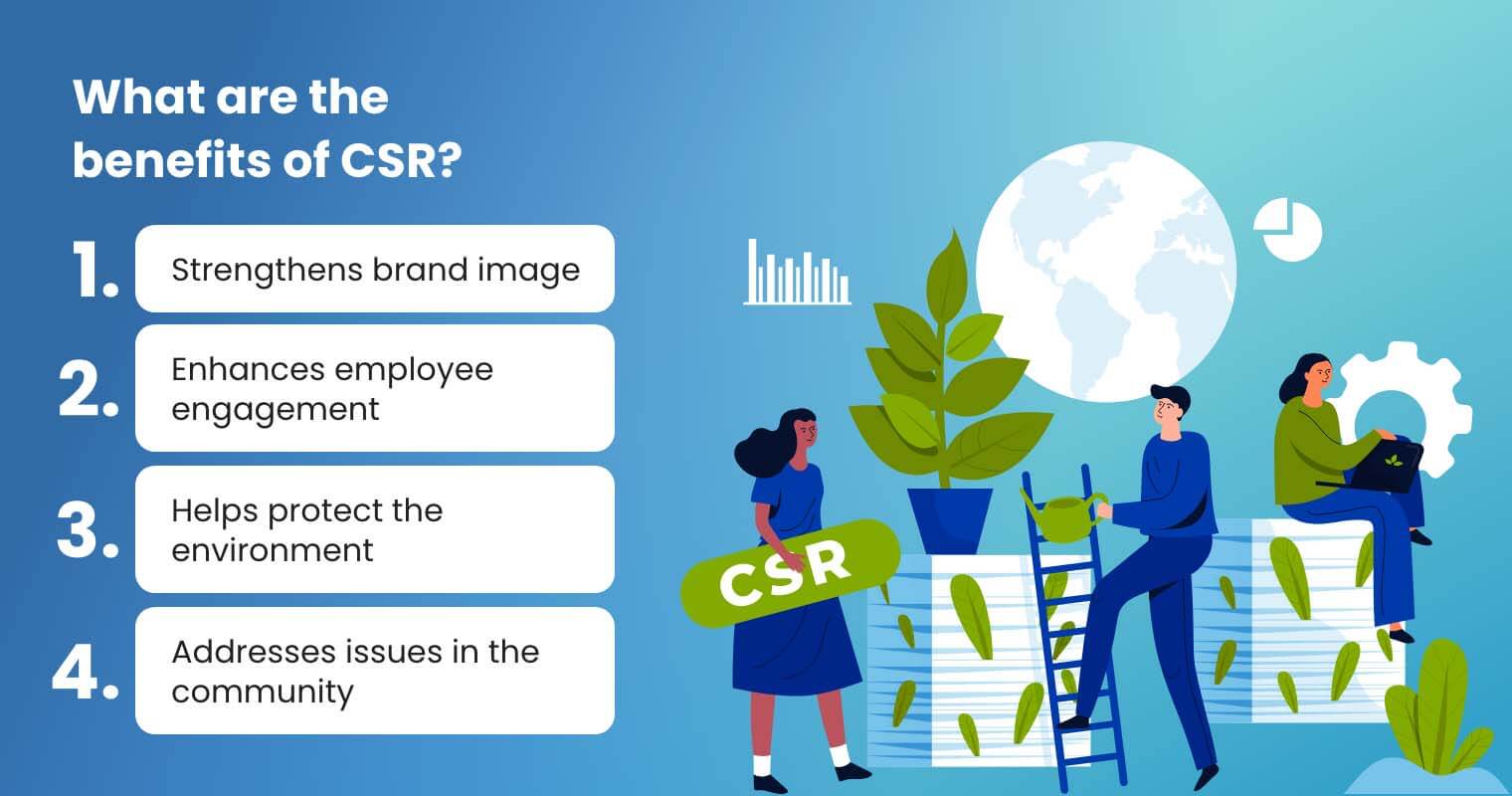For decades, businesses were all about raking in profits and delivering the highest returns. This is relatively understandable because, from a shareholder perspective, this was the benchmark of a successful company. But times are changing. In recent years, the standard for a thriving business has significantly shifted to a more holistic approach that not only considers their financial performance but also the company’s social responsibility and employee welfare.
In 2022, an estimated 98% of companies on the S&P 500 index reported their corporate social responsibility (CSR) efforts, reflecting a consistent commitment compared to the 99% record in the previous year.
Today, consumers and investors alike are looking for companies that do more and give more. They want to support organizations that are socially responsible and environmentally conscious. The question is: Is your company prepared to meet these expectations?
In this guide, you’ll learn about the fundamentals of CSR, its types, and benefits, and get some real-life examples to help you ponder effective CSR practices.
What is corporate social responsibility?
Corporate social responsibility, also known as corporate citizenship, is a business practice that helps organizations address environmental and social issues through its operations.
As the term implies, CSR signals that a company is or must be socially responsible and accountable for its actions. Therefore, CSR must go beyond profit generation and legal obligations. It is a way for organizations to create initiatives or programs that positively impact the world, like reducing carbon footprints, promoting fair labor practices, and supporting community development.
Effective CSR strategies can boost a company’s reputation and set it apart from its competitors. As consumers now look for brands that match their values, businesses that put their focus on social responsibility, as much as they do on financial gain, are more likely to attract and retain customers. Ultimately, CSR contributes to a better society and a more sustainable company.
Corporate Social Responsibility vs. Corporate Sustainability
While both terms encourage organizations to be aware of their impact on the community and the world, CSR and Corporate Sustainability have distinct priorities.
CSR centers on implementing specific projects that may not directly impact a company’s long-term profitability. While it contributes to sustainability, it doesn’t necessarily need to be integrated into the core business strategy. A good example is a company sponsoring local charity events or volunteering programs. In all likelihood, these initiatives benefit both the business and the community but don’t always directly affect the company’s financials.
Corporate sustainability, on the other hand, is a system-wide approach that seeks to integrate environmental, social, and governance (ESG) factors into every aspect of a company’s operations. This means that whatever decisions are made or actions are taken, there should be a careful consideration of their impact on the triple bottom line: the people, the planet, and the business’ profitability. The goal is to create long-term value by balancing all three objectives.
Four Types of Corporate Social Responsibility

Generally, company initiatives fall under the four types of corporate social responsibility: environmental, ethical, philanthropic, and economic. All of which play a part in their overall commitment to social good and sustainable practices.
Environmental Responsibility
This type of social responsibility involves organizations behaving in a way that prioritizes the environment. Some may call this environmental stewardship or eco-consciousness.
Examples of environmental responsibility are:
- Waste Reduction and Management: Launching or sponsoring programs that reduce pollution, greenhouse gas emissions, and waste.
- Renewable Energy Transition: Increasing reliance on renewable energy sources.
- Sustainable Community Initiatives: Engaging in community actions like planting trees and funding environmental research.
Ethical Responsibility
Ethical responsibility is an organization’s commitment to operate fairly and ethically. This is often manifested through fair treatment of all stakeholders, including leadership, investors, employees, suppliers, and customers. Some ethical responsibility examples are:
- Fair Labor Practices: Ensuring fair wages, safe working conditions, and adherence to labor laws.
- Diversity and Inclusion: Promoting diversity and inclusivity in the workplace and ensuring equal opportunities for all.
- Anti-Corruption: Implementing robust anti-corruption policies and procedures to prevent bribery and corruption.
- Consumer Protection: Protecting consumer rights through fair pricing, honest advertising, and product safety.
Philanthropic Responsibility
What is philanthropic responsibility? The third type of CSR refers to the organization’s philanthropic responsibility to give back to the community and support initiatives that improve the quality of life. This responsibility involves dedicating a portion of their profit to support various social causes, such as education, healthcare, and disaster relief. Other companies even go as far as establishing their own charitable foundations to give back to their community.
It can take many forms, but the most common philanthropic responsibility examples include:
- Monetary Donations: Organizations contribute funds to support causes that mostly align with their values to uphold their philanthropic responsibility and offer essential resources to those in need.
- Volunteer Efforts: Companies encourage employees to engage in volunteer activities, such as community clean-ups or mentoring programs, to share their time and skills to benefit local communities.
- Partnerships with Nonprofits: Collaborating with nonprofits enables organizations to leverage resources and expertise, co-develop programs, and support fundraising efforts.
- Scholarships and Educational Programs: Establishing scholarships or funding educational initiatives provides opportunities for underprivileged individuals and helps create a more equitable society.
- Health and Wellness Programs: Regarding healthcare, companies may fund health-related causes, such as medical research or mental health initiatives, improving community well-being.
Economic Responsibility
At the center of CSR is the company’s economic responsibility to back all of its financial decisions to support social good, which is critical to implementing environmental, ethical, and philanthropic plans. This type of responsibility reflects a company’s dedication to generating economic value while considering the well-being of its stakeholders.
Economic responsibility examples usually include:
- Fair Trade Practices: This practice means ensuring producers receive fair compensation for their goods and promoting ethical sourcing to improve livelihoods in developing communities.
- Financial Sustainability: Companies that prioritize their economic health focus on long-term viability through prudent financial management and responsible investment strategies that consider environmental and social impacts.
- Tax Compliance: Adhering to tax regulations and fulfilling obligations helps organizations contribute to public resources and infrastructure.
What are the benefits of CSR?
CSR initiatives make companies accountable for their impact on society and the environment. In return, this benefits them in the long run. How?

Strengthens brand image
From a business perspective, engaging and promoting CSR enhances a company’s reputation and strengthens its brand image. This makes them more appealing to customers and investors. A positive reputation can lead to increased customer loyalty, as consumers are more likely to support businesses that align with their values. NielsenIQ published a study that showed 78% of consumers leaning towards a sustainable lifestyle–further implying a growing awareness and preference for brands that are environmentally and socially conscious. This heightened consumer loyalty can translate into more revenue, especially having customers willing to pay a premium for products and services from companies they trust and admire.
Enhances employee engagement
CSR initiatives significantly enhance employee engagement and satisfaction. When organizations actively participate in socially responsible practices, employees tend to feel a greater sense of purpose and connection to their work. According to an independent study from the State University of New York, companies prioritizing CSR can more easily hire and retain employees who demonstrate higher job satisfaction, lower turnover intentions, improved performance, and better customer service.
Helps protect the environment
CSR is also instrumental in the overall health of the planet, as it encourages environmental responsibility. Ecological initiatives can help companies reduce their greenhouse gas emissions or pursue net-zero emissions goals, which are vital to slowing climate change. They might also aid in conserving natural resources, reducing pollution, and limiting disruption of ecosystems. In addition, many companies that embrace CSR actively raise awareness about environmental issues, consequently promoting sustainable behaviors among both consumers and businesses.
Addresses issues in the community
On a societal level, CSR programs play a vital role in supporting local communities and addressing societal issues such as poverty, inequality, and environmental concerns. By fueling economic growth through job creation, CSR can enhance community welfare. Furthermore, companies that lead the way in ethical behavior can shape public opinion, inspiring others to follow suit and creating a positive ripple effect.
Real-World CSR Initiatives
More and more companies are committing to socially responsible practices. Here are two notable real-world examples:
Microsoft
Microsoft’s CSR initiatives reflect its commitment to creating a more inclusive and eco-friendly world. Through the Technology Education and Learning Support (TEALS) program, Microsoft connects tech industry volunteers with high school teachers to establish equitable computer science education in underserved communities, particularly those with high populations of Black and African American students. In addition, the company offers free digital literacy courses designed to equip individuals with essential skills to navigate the digital landscape, thus fostering promising futures.
To advance social equity, Microsoft’s Airband Initiative aims to provide affordable Internet access to the approximately 2.7 billion people globally who lack connectivity, enabling them to participate in education, work, and telehealth services. On the environmental front, Microsoft has invested significantly in sustainability, including acquiring 1.4 million tons of carbon removal in 2022 and setting ambitious goals to be carbon-negative, water-positive, and produce zero waste by 2030.
General Motors
General Motors (GM) is a multinational automotive manufacturing company that commits itself to creating a clean, safe, and equitable world for all. In 2022, GM was honored with the Sustainability Leadership Award from the Business Intelligence Group, a testament to its commitment to environmental stewardship.
GM aims to achieve carbon neutrality in its global products and operations by 2040 as part of its sustainability strategy. To support this goal, the company has secured agreements to utilize 100% renewable electricity at all U.S. sites by the end of 2025, with plans to expand this commitment globally by 2035. The company has made impressive progress, with renewable energy consumption in the U.S. reaching 59% in 2023, and global renewable consumption totaling 2.2 million MWh. They promise to continue investing in clean energy solutions and sustainable practices in the coming years.
Integrate Corporate Social Responsibility with Convene

Corporate social responsibility is no longer just a nice-to-have; it’s a fundamental aspect of modern business. As organizations embark on their CSR journeys, effective planning and collaboration are crucial. This is where board portals like Convene can simplify the process, enabling seamless communication and efficient management of CSR initiatives.
With Convene, the leading board management software, you can enhance your planning efforts and streamline meetings with executives, ensuring that everyone stays aligned throughout the process. Here are some key features that make Convene an invaluable tool for planning and meetings:
- Live Video Conferencing: Host virtual meetings with team members and stakeholders, regardless of their location.
- Annotation Tools: Easily mark up documents and presentations during and after discussions to expedite feedback.
- Secure Document Library: Store and share all important documents in a secure, centralized location, making it easy for your team to access necessary materials. An added permission-based access is also available to guarantee that only authorized members have access to important files.
- Integrated Voting Features: Facilitate quick decision-making by allowing team members to vote directly within the platform.
- E-Signature: Simplify approvals and agreements with secure electronic signatures, speeding up the documentation process.
Learn how Convene can help you thrive in the socially responsible business landscape by scheduling a one-on-one demo with one of our product experts–today.
Jess is a Content Marketing Writer at Convene who commits herself to creating relevant, easy-to-digest, and SEO-friendly content. Before writing articles on governance and board management, she worked as a creative copywriter for a paint company, where she developed a keen eye for detail and a passion for making complex information accessible and enjoyable for readers. In her free time, she’s absorbed in the most random things. Her recent obsession is watching gardening videos for hours and dreaming of someday having her own kitchen garden.











